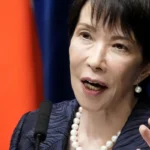
Khamenei rejects direct dialogue with USA and accuses Washington of wanting Iran’s surrender
Iran’s supreme leader, Ayatollah Ali Khamenei, returned to the center of attention on Sunday (24) by discarding the possibility of direct negotiations with the United States. In a challenging tone, the most powerful cleric in the country accused Washington of seeking not an agreement, but the capitulation of the Islamic Republic.
It was the first time that Khamenei appeared in public full since the 12 -day war against Israel in June. Until then, the leader was limited to brief video speeches and protocoral appearances, which fed speculation about his health and also his safety, as Israeli authorities had threatened to murder him.
Also read:
US Border Wall will be painted with black paint to be hostile
White House presses and questions independence of intelligence
Wall Street plummets with AI -pressing actions
Amid expectation, thousands of Iranians followed the speech. Ayatollah took the moment to criticize both the US government and sectors of internal policy that defend a rapprochement with Washington. “This person who is currently in charge of the US has revealed the essence of his hostility to Iran-essentially, that they want the Iranian nation and the Islamic Republic to income,” he said, not directly mentioning the name of US President Donald Trump.
In addition to condemning what he considers external pressure, Khamenei directed attacks on local political figures that call for a direct dialogue with the US. He classified such positions as “superficial” and ensured that “the Iranian nation will position itself firmly against such demands [dos EUA]”.
The leader’s words come in a moment of intense debate within the country. Reformists have been pressuring the government to reopen the diplomatic channels, even considering the suspension of the uranium enrichment program in exchange for a relief in the tensions with the West. For these sectors, the resumption of negotiations could mean an important step towards political and economic changes. Among the advocates of this path is Mostafa Tajzadeh, known opponent and currently arrested, who argues that an agreement could make room for structural reforms.
However, the conservative field reacts hard. Bat line parliamentarians and religious leaders used tribunes, including traditional Friday sermons to criticize any approximation attempt. Some even suggested the dismissal of President Masoud Pezeshkian, elected last year with the support of reformist wings.
Despite the pressure, Khamenei showed back the president, warning that internal disputes could further weaken the country in the face of external threats. Positioning reinforces the delicate political balance in Tehran: on the one hand, the voices that ask for changes and, on the other, the staunch resistance of the most conservative sectors that see any concession as a sign of fragility.
Meanwhile, diplomats keep trying to find ways of dialogue. Last month, Iranian Foreign Minister revealed that he maintained contacts with Steve Witkoff, a US special envoy, which would have proposed the resumption of conversations. The opening, however, seems distant in the face of the current stance of the Supreme Leader, who remains firm in his rejection of what he considers unacceptable pressures.
Khamenei’s speech rekindles the tension on the future of relationships between Tehran and Washington and shows that despite internal and external pressures, Ayatollah is not willing to give in grounds.
“The people must support those who serve the nation, especially the president, who is hardworking and persistent,” he said in a clear rebuke to the row that calls for the dismissal of Pezeshkian.
Speech occurred at a time when Iranian society still lives under strong anxiety after the June war against Israel. The conflict, which extended for almost two weeks, left a devastating balance: more than a thousand killed civilians and the loss of dozens of military commanders and high -ranking nuclear scientists. In addition, the United States joined Israel in bombing to Iranian nuclear facilities, marking a point of maximum tension in the region.
Although hostilities ceased, there was no signing of a formal ceasefire. This maintains the population in constant alert to the possibility of a resumption of war. The fears intensify in the face of recurring fire reports in several cities of the country, interpreted by public opinion as signs of an in -progress clandestine offensive. The government, however, denies any connection of these incidents with military operations.
Even in the face of international pressure and internal wear and tear, Tehran gives no signs of retreating in his nuclear program. Last Friday (22), the group known as E3-formed by Britain, France and Germany-made a telephone call with the Iranian Foreign Minister to discuss the possibility of triggering the “instant return” mechanism of sanctions before October 18.
This device is part of the 2015 nuclear agreement and allows us to automatically reimpts the UN sanctions if Iran is found to breach the established limits for its atomic activities. The calendar is tight: Although the mechanism can only be used until October 18, the process needs to be started in advance, leaving the European powers a few weeks to make a decision.
The impasse refers to the collapse of his own agreement, which began in 2018, when the United States retired unilaterally under the Trump administration. Since then, Tehran claims that the pact is no longer valid, claiming that E3 has not fulfilled its part in relieving sanctions in exchange for the limitation of the Iranian nuclear program.
Now, in the face of the threat of new punishments, the Iranian government maintains an adamant position. Authorities reject the possibility of cooperation with the International Atomic Energy Agency (AIEA), suspended since June attacks, and show no openness to resume direct negotiations with Washington.
The newly appointed secretary of the Supreme National Security Council, Ali Larijani, reinforced this stance in an interview with the state press. “If we agree today, in six months we will be asked to do the same again. This is not sustainable,” he said, in reference to the hypothesis of accepting an extension of the term given by E3 to avoid the return of sanctions.
The statements make it clear that Tehran intends to maintain their resistance strategy, even in the risk of deepening international isolation. The dilemma now falls on Europeans, who need to decide to press harder or seek a diplomatic exit that can prevent the Middle East from plunging into a new confrontation cycle.
With information from Financial Times*
Source: https://www.ocafezinho.com/2025/08/24/khamenei-ergue-muralha-contra-a-rendicao-ao-ocidente/

